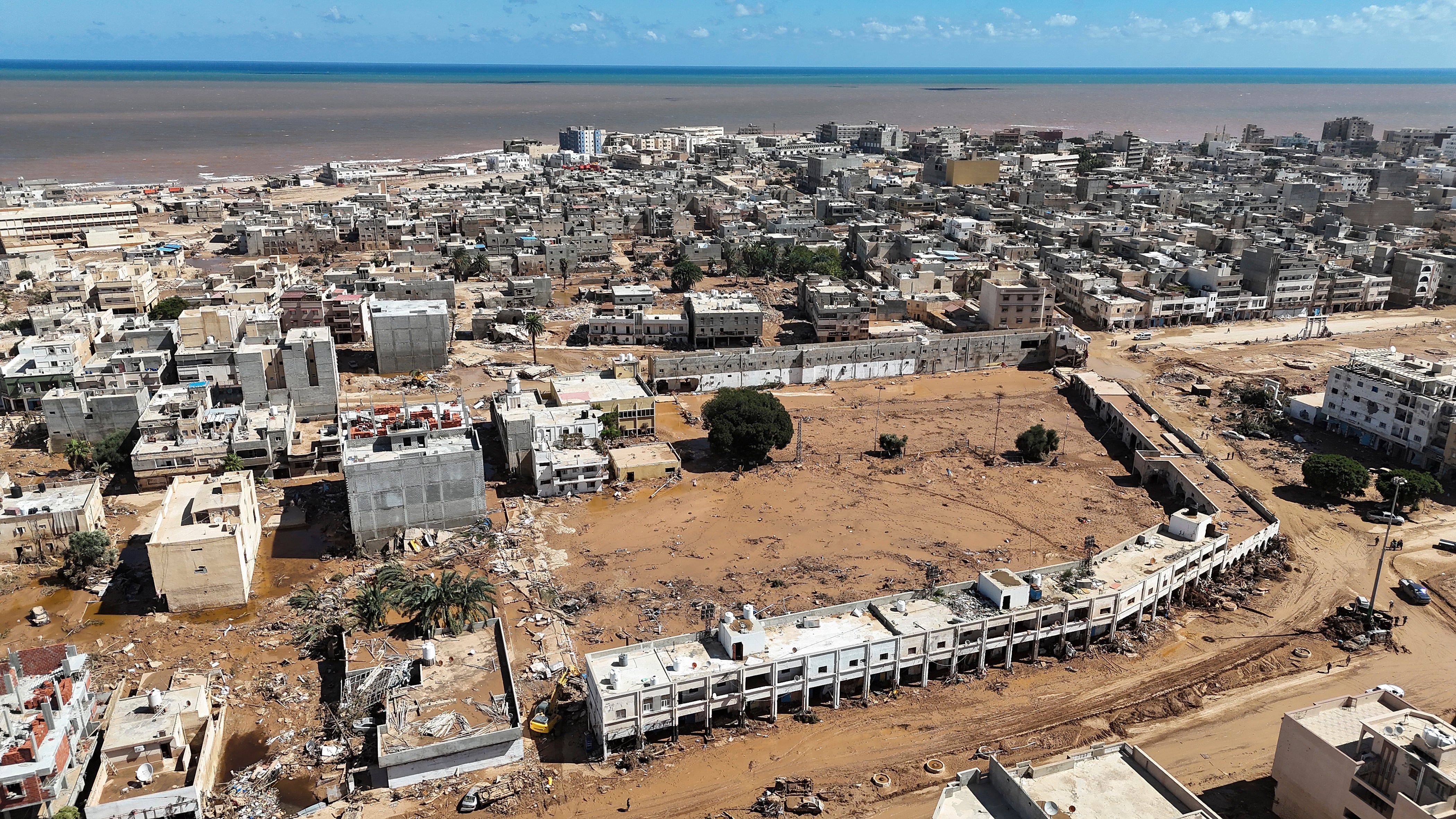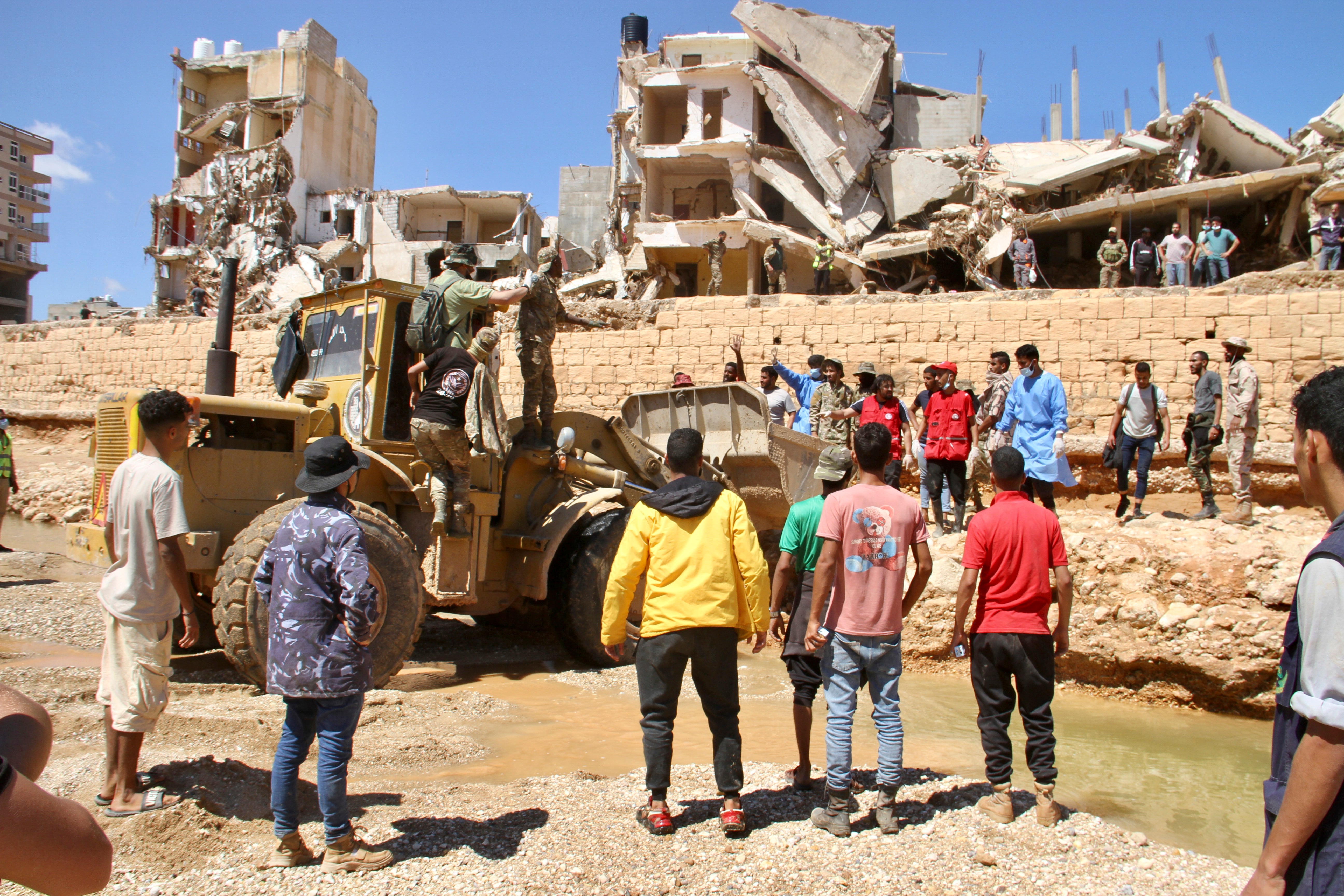Fury over ‘avoidable’ deaths in Libya floods as thousands buried in mass graves with 11,000 confirmed killed
Officials in hardest-hit city of Derna believe toll could reach 20,000 – amid calls for inquiry into collapse of dams that drove flooding

Fury is growing over the thousands of people killed in the flooding that has devastated Libya – with calls for an urgent inquiry over what one UN official called the “avoidable” death toll.
Thousands have been buried, mostly in mass graves, in the worst-hit eastern city of Derna, with thousands more bodies waiting to be processed. Officials in the port city believe that the final death toll could reach 20,000.
Libya’s Red Cresent said that 11,300 people had been confirmed as dead in the disaster, driven by the collapse of two dams with Storm Daniel pounding the country’s coast. Marie el-Drese, secretary general of the aid group, said that it believed around 10,000 were missing.
Rescue efforts and body recovery operations have been hampered by the chaotic nature of the conflict-ridden nation, which is split between rival eastern and western administrations. An internationally recognised Government of National Unity (GNU) is based in Tripoli, in the west. A parallel administration operates in the east, under control of the Libyan National Army of Khalifa Haftar, who failed to capture Tripoli in a bloody 14-month siege that unravelled in 2020.
The head of the UN’s World Meteorological Organisation (WMO) said that the huge loss of life could have been avoided if Libya – a failed state for more than a decade – had a functioning weather agency in place. “If there would have been a normal operating meteorological service, they could have issued the warnings,” Petteri Taalas said in Geneva. “The emergency management authorities would have been able to carry out the evacuation.”

A report by a state-run audit agency in 2021 said the dams outside Derna, built in the 1970s, had not been maintained despite the allocation of money for that purpose in 2012 and 2013.
Libya’s Tripoli-based prime minister, Abdul Hamid Dbeibah, acknowledged the maintenance issues in a Cabinet meeting on Thursday and called on the public prosecutor to open an urgent investigation into the dams’ collapse. Mohamed al-Menfi, head of the three-member council that acts as the presidency in the internationally recognised government, said that anyone whose actions or failure to act were responsible for the collapse of the dams should be held accountable, along with anyone who held up aid.
The WMO said earlier this week that the National Meteorological Centre had issued warnings 72 hours before the flooding, notifying all governmental authorities by email and through media. Officials in eastern Libya warned the public about the coming storm and on Saturday had ordered residents to evacuate areas along the coast, fearing a surge from the sea. But there was no warning about the dams collapsing.
Wali Eddin Mohamed Adam, 24, a Sudanese brick factory worker living on Derna’s outskirts, awoke to the boom of the water on the night of the storm and rushed to the city centre to find it was gone. Nine of his fellow workers were lost, and around 15 others had lost their families, he told Reuters.
“All were swept away by the valley into the sea,” he said. “May God have mercy upon them and grant them heaven.”

Rescue teams have arrived from Egypt, Tunisia, the United Arab Emirates, Turkey and Qatar. Turkey sent a ship carrying equipment to set up two field hospitals. Italy sent three planes of supplies and personnel, as well as two navy ships that had difficulty unloading because Derna’s debris-choked port was almost unusable.
The World Health Organisation (WHO) said it would release $2m (£1.6m) from its emergency fund to support the victims, calling the floods a “calamity of epic proportions”. It added it would send trauma, surgical and emergency supplies from its logistics hub in Dubai.
The disaster has brought a rare moment of unity, as government agencies across the country rushed to help the affected areas.
While the Tobruk-based government of east Libya is leading relief efforts, the Tripoli-based western government allocated the equivalent of $412 million for reconstruction in Derna and other eastern towns destroyed by the flooding.
Nothing but rubble and a washed-out road were left on Thursday at the site of the dam that had once protected Derna. Streets were covered in deep mud and strewn with uprooted trees and hundreds of wrecked cars, many flipped on their sides or roofs. Derna’s mayor, Abdulmenam al-Ghaithi, said he was afraid the city would now be infected with an epidemic, “due to the large number of bodies under the rubble and in the water”. The two things in shortest supply are drinking water and body bags.
“I survived with my wife but I lost my sister,” said Mohamed Mohsen Bujmila, a 41-year-old engineer. “My sister lives downtown where most of the destruction happened,” he told Reuters. “We found the bodies of her husband and son and buried them.”
As he spoke, an Egyptian search-and-rescue team nearby recovered the body of his neighbour.
“This is Aunt Khadija, may God grant her heaven,” Mr Bujmila said.
Reuters and Associated Press contributed to this report
Join our commenting forum
Join thought-provoking conversations, follow other Independent readers and see their replies
Comments
Bookmark popover
Removed from bookmarks